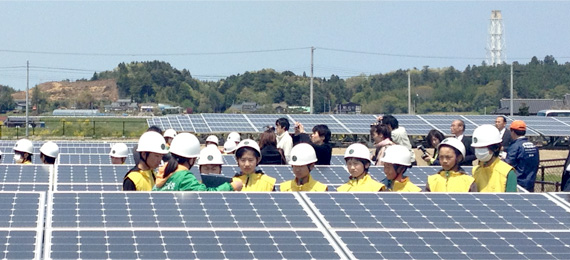The Japanese group’s transmission and distribution systems business — a unit that sells PV systems under the Energy Systems and Solutions division — reported “lower sales on deteriorated market conditions in solar photovoltaic systems.” The unit recorded net sales of JPY 58.4 billion in the first quarter, down 8.1% year on year.
Toshiba — which posted a group net loss of JPY 460 billion in the preceding fiscal year — attributed its poor results in the 12 months to the end of March 2017 to a $11,096.3 million loss posted by Westinghouse, its bankrupt U.S. nuclear unit. The Tokyo-based conglomerate recorded group net income of JPY 50.3 billion in the first quarter of the current fiscal year, from JPY 79.8 billion in the same period a year earlier.
The group’s financial position sharply worsened in the year to the end of March 2017, with total assets of JPY 4,269.5 billion, down roughly JPY 1,163.8 billion from the preceding 12-month period. Group net sales hit JPY4,870.8 billion in fiscal 2016, down roughly JPY 284 billion from the preceding fiscal year. However, it reported group net sales of JY 1,143.6 billion in the April-June period, up JPY 86.4 billion from the first quarter of fiscal 2016.
Toshiba has been struggling to survive since 2015, when it emerged that it had misrepresented its annual earnings statements for much of the past decade. It was dealt another blow late last year, when it reported crushing losses for its Westinghouse nuclear business in the U.S.
In March of this year, Reuters reported that Toshiba was preparing to sell off its majority stake in Switzerland’s Landis+Gyr in a bid to recover from its losses related to Westinghouse. However, the Zug-based smart-meter specialist was included as a subsidiary in the Japanese group’s results for fiscal 2016 and the first quarter of the current fiscal year. In a separate statement issued this week, Landis+Gyr reported net revenue of $433 million and earnings before interest, taxes, depreciation, and amortization (EBITDA) of $54.6 million for the three months to the end of June.
PwC Aarata audited Toshiba’s latest financial statements, ending a months-long effort by the Japanese group to get auditors to sign off on its results. For now, the company appears to have at least temporarily dodged the risk of being delisted from the Tokyo Stock Exchange (TSE), as it managed to finally post its delayed earnings report before a deadline set by the market regulator. Its stock was removed from the TSE’s main board in June. However, the company could still be delisted if its liabilities end up exceeding its assets for the current fiscal year.
To survive, Toshiba will need to complete the sale of its memory chip unit within the current fiscal year, in order to cover its $6.3 billion writedown on its bankrupt Westinghouse unit. However, a proposal to sell the business to a consortium led by the state-backed Innovation Network Corp. of Japan, U.S. private equity firm Bain Capital and South Korean chipmaker SK Hynix remains tied up in court, partly in the face of a competing bid by Foxconn Technology and Western Digital.
Toshiba — which expects to report group net income of JPY 230 billion for the current fiscal year to the end of March 2018 — sells residential PV systems, but mainly in the Japanese market. In recent months, it has revealed plans to install rooftop solar panels with storage batteries and hydrogen production capacity in Japan, in addition to providing Integrated control systems for a virtual power plant demonstration that a subsidiary of Tokyo Electric Power (Tepco) is building in Yokohama.
This content is protected by copyright and may not be reused. If you want to cooperate with us and would like to reuse some of our content, please contact: editors@pv-magazine.com.



1 comment
By submitting this form you agree to pv magazine using your data for the purposes of publishing your comment.
Your personal data will only be disclosed or otherwise transmitted to third parties for the purposes of spam filtering or if this is necessary for technical maintenance of the website. Any other transfer to third parties will not take place unless this is justified on the basis of applicable data protection regulations or if pv magazine is legally obliged to do so.
You may revoke this consent at any time with effect for the future, in which case your personal data will be deleted immediately. Otherwise, your data will be deleted if pv magazine has processed your request or the purpose of data storage is fulfilled.
Further information on data privacy can be found in our Data Protection Policy.